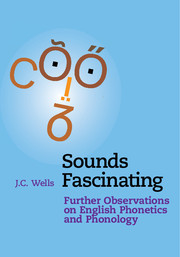4 - Names
from PART I - WORDS, NAMES, PEOPLE, AND PLACES
Published online by Cambridge University Press: 05 September 2016
Summary
Israel
Have you noticed how some people pronounce Israel as ˈɪzraɪel when singing? I'm struck by how they sing it in the Advent hymn:
O come, O come, Emmanuel
And ransom captive Israel!
with its refrain:
Rejoice! Rejoice! Emmanuel
shall come to thee, O Israel.
In LPD I said that Israel, in speech normally ˈɪzreɪl or ˈɪzriəl, is ‘in singing usually ˈɪzreɪel’. But on reflection I certainly ought to have mentioned this further possibility with -aɪ-.
Where on earth could this treatment of the second vowel have come from? It's not straightforwardly based on the spelling; there are all sorts of vowel sounds that correspond to the spelling a, but aɪ is not one of them.
On reflection I think that we have a tendency (perhaps ‘rule’ would be to put it too strongly) to change ɑː to aɪ before a following front vowel (a position from which it is usually shielded by a linking or intrusive r). It's a kind of anticipatory articulation.
We see this in the word naïve. On the basis of the French it ought to be nɑːˈiːv. In practice people mostly say naɪˈiːv.
If for Israel we assume a starting point ˈɪzrɑːel, based on the spelling or the Latin or Hebrew pronunciation (real or assumed), then my proposed near-rule would make it ˈɪzraɪel. QED.
There are two further Biblical names that are relevant here: Canaan and Sinai. For foreign words of this vintage, long a would be expected to be read as eɪ (as in Amos, Salem, Jacob, Emmaus), not as ɑː. But in this unstressed prevocalic position the vowel typically either weakens to i or disappears entirely: ˈkeɪn(i)ən, ˈsaɪn(i)aɪ.
Laocoön
I hope it's not going to be too boring if I again mention people's increasing ignorance of how to pronounce classical names. A BBC television programme I watched – one which targets an intellectual rather than a popular audience – involved an odd-man-out question in which one of the candidates was Laocoön. Classicists and, I imagine, art historians know that this name is traditionally pronounced in English as leɪˈɒkəʊɒn. Everyone involved in the TV programme called it læˈkəʊən. This does not even correspond to the spelling, since it ignores the o of Lao-. But they all said it, so I suppose the producer must have told them to.
- Type
- Chapter
- Information
- Sounds FascinatingFurther Observations on English Phonetics and Phonology, pp. 31 - 35Publisher: Cambridge University PressPrint publication year: 2016

